Unit5 Do you want to watch a game show?复习课件 (共23张PPT)
文档属性
| 名称 | Unit5 Do you want to watch a game show?复习课件 (共23张PPT) | 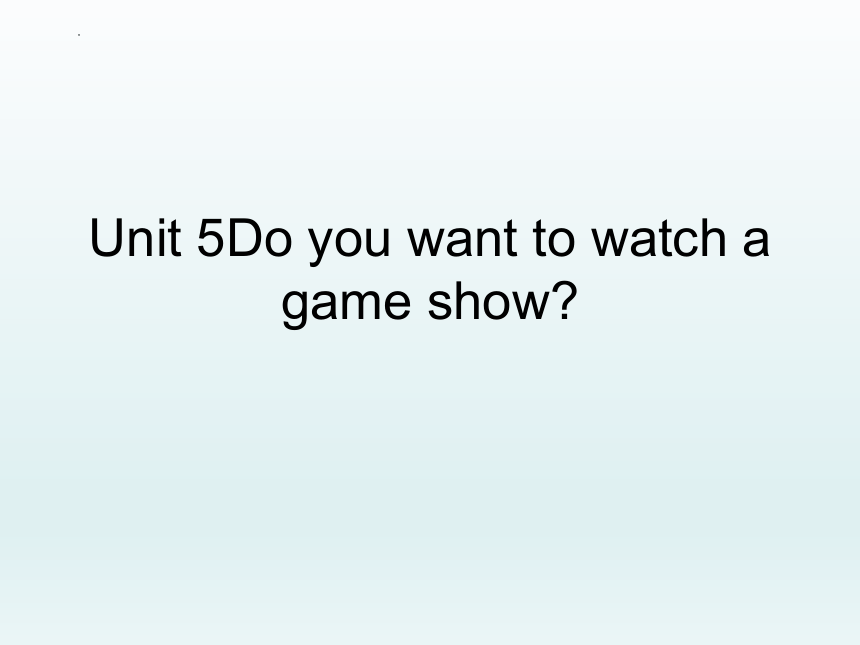 | |
| 格式 | zip | ||
| 文件大小 | 145.5KB | ||
| 资源类型 | 教案 | ||
| 版本资源 | 人教新目标(Go for it)版 | ||
| 科目 | 英语 | ||
| 更新时间 | 2022-07-28 08:41:28 | ||
图片预览

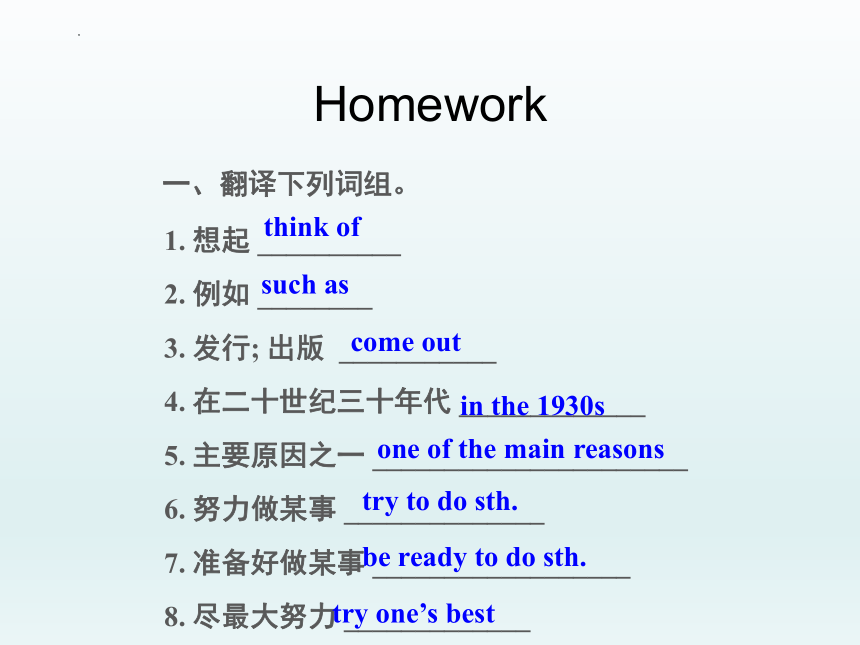
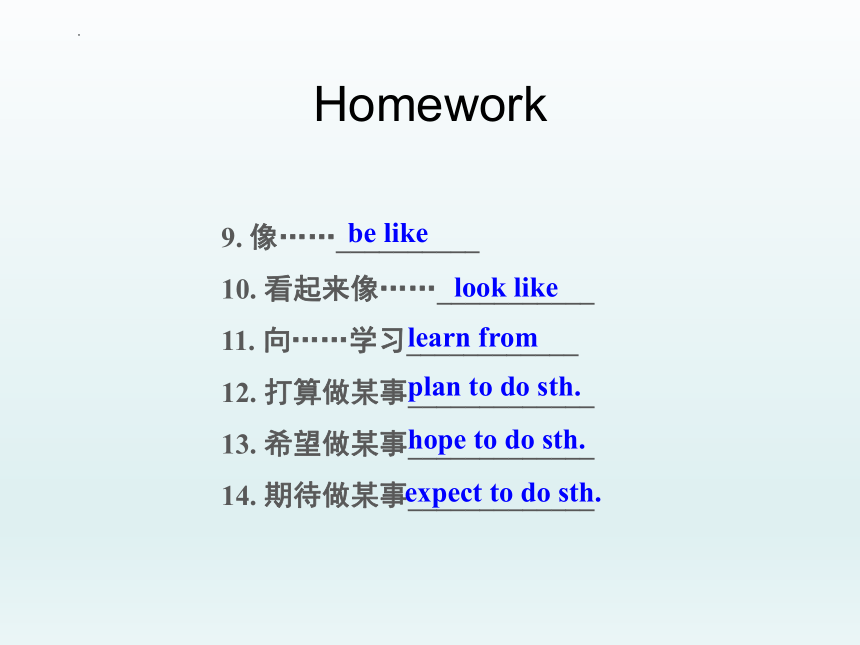
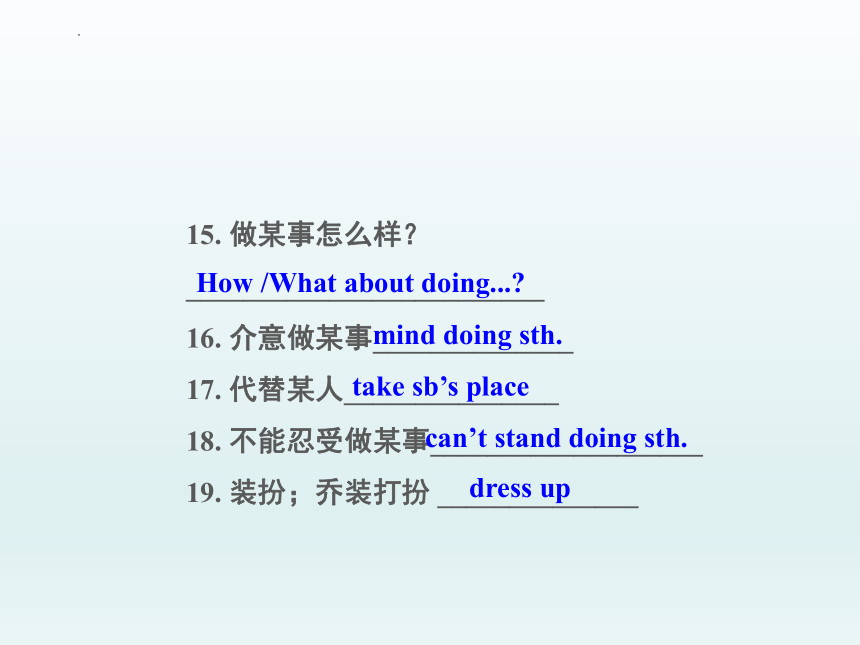
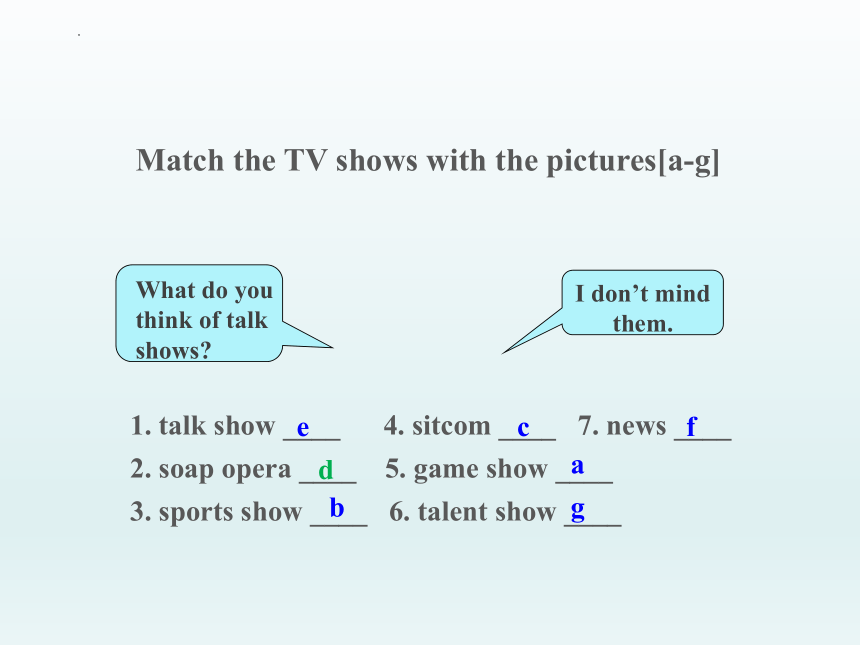
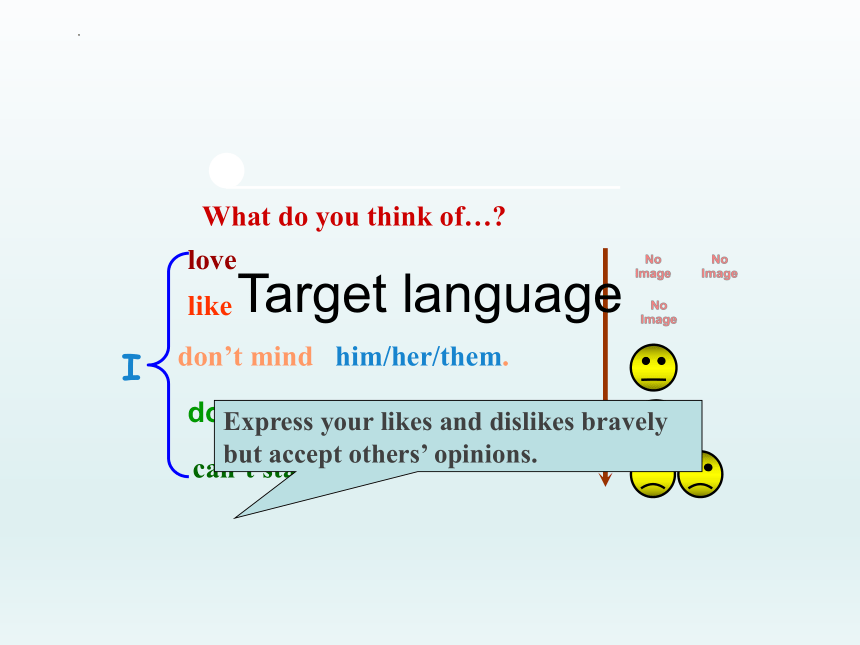
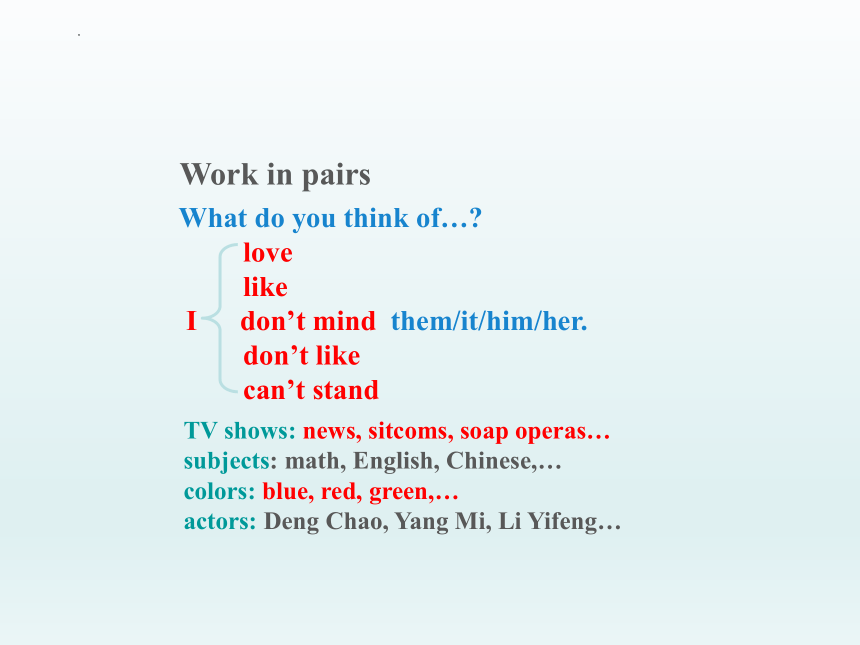


文档简介
(共23张PPT)
Unit 5Do you want to watch a game show
一、翻译下列词组。
1. 想起 __________
2. 例如 ________
3. 发行; 出版 ___________
4. 在二十世纪三十年代 _____________
5. 主要原因之一 ______________________
6. 努力做某事 ______________
7. 准备好做某事 __________________
8. 尽最大努力 _____________
think of
come out
in the 1930s
one of the main reasons
be ready to do sth.
try one’s best
try to do sth.
such as
Homework
9. 像……__________
10. 看起来像……___________
11. 向……学习____________
12. 打算做某事_____________
13. 希望做某事_____________
14. 期待做某事_____________
be like
look like
learn from
plan to do sth.
hope to do sth.
expect to do sth.
Homework
15. 做某事怎么样?_________________________
16. 介意做某事______________
17. 代替某人_______________
18. 不能忍受做某事___________________
19. 装扮;乔装打扮 ______________
mind doing sth.
can’t stand doing sth.
take sb’s place
How /What about doing...
dress up
Match the TV shows with the pictures[a-g]
1. talk show ____ 4. sitcom ____ 7. news ____
2. soap opera ____ 5. game show ____
3. sports show ____ 6. talent show ____
d
What do you think of talk shows
I don’t mind them.
e
b
c
a
g
f
What do you think of…
love
like
don’t mind him/her/them.
don’t like
can’t stand
I
Express your likes and dislikes bravely but accept others’ opinions.
Target language
What do you think of…
love
like
I don’t mind them/it/him/her.
don’t like
can’t stand
TV shows: news, sitcoms, soap operas…
subjects: math, English, Chinese,…
colors: blue, red, green,…
actors: Deng Chao, Yang Mi, Li Yifeng…
Work in pairs
1. What do you think of ...
你认为……怎么样?
这个句型用来询问别人对某事的看法,也可以说How do you like ... 。当然对这样的问题不能简单地用yes或no来回答,而要具体说明理由。
What do you think of the food here
你觉得这里吃得怎样?
1. —What do you think of the book
— ________________
A. I’m sorry. B. It’s wonderful.
C. Guess what! D. Thank you.
B
2. —What do you think of the documentary A Bite of China
—________. It has attracted lots of TV audiences.
A. Enjoy yourself B. Many thanks
C. Pretty good D. It's hard to say
C
3. What do you think of Man and Nature (改为同义句)
______ do you ______ Man and Nature
How
like
mind 的用法
1)我不介意体育节目。I don't mind sports shows.
2)你介意打开门吗?Do you mind opening the door
3)你介意我帮助你吗?Do you mind my helping you
mind 表示“介意,反对”的意思时,通常用在否定句、疑问句中。
经常用到的句型:
mind doing sth. 介意做某事
mind one's doing sth. 介意某人做某事
问题探究
1. plan 的用法
1)制定一个计划 make a plan
2)我们计划参观长城。We plan to visit the Great Wall.
plan 意为“计划,打算”。既可以作为动词,又可以作为名词,
常用的句型为:plan to do sth. 计划做某事。
2. hope 的用法
1)我希望你能很快好起来。I hope you can get well soon.
2)我希望能很快见到你。 I hope to see you soon.
hope 意为“希望”,经常用到的句型为:
hope to do sth. 希望做某事;
hope 后面还可以跟宾语从句,但不能接双宾语。
3. hope to do sth. 希望做某事
I hope to hear from you soon.
我希望不久能收到你的来信。
hope后面还可以接that引导的从句。如:
I hope that you’ll be better soon.
我希望你能很快好起来。
问题探究
3. expect 的用法
1)我期待着明天去北京。
I expect to go to Beijing tomorrow.
2)我期待你能和我一起去北京。
I expect you to go to Beijing with me.
3)我期待你能通过考试。
I expect that you can pass the test.
expect 意为“期待,盼望,预期”。
其句型为:expect to do sth. 期待做某事;
expect sb. to do sth. 期待某人做某事;
此外 expect 后面还可以跟宾语从句。
问题探究
4. happen 的用法
1)这个故事发生在2003年。This story happened in 2003.
2)你怎么了?What haasppened to you
3)昨天我在街上碰巧遇到了我的一个朋友。
I happened to meet a friend of mine in the street yesterday.
表示“某地(某时)发生了什么事”,常用 “happen in/at + 某地”这一结构来表达,这时主语应该是事情。
表示“某人出了某事(常指不好的事)”,要用“ sth. + happen + to sb.”这一结构来表达。
表示“某人碰巧做某事”,要用“ sb. + happen + to do sth.”这一结构来表达。
5. I can’t stand them.
stand v. 忍受
She is funny, but I can’t stand her.
她滑稽,但我无法忍受她。
She cannot stand having/to have nothing to do.
没有事干她受不了。
stand v. 站立
—What do you think of soap operas
—_______. But my mother likes them.
A. I like them B. I enjoy them
C. I can’t stand them D. I don’t agree
【解析】 根据答语中的 But 可 知,前后句之间是转折的关系。I can’t stand them 表示“我不能忍受”,符合语境。
C
用 hope, wish, expect 的适当形式填空
1. I didn’t ______ that he should fail in the
examination.
2. “Can we be late for class ” “I ______not.”
3. She ______ me success.
expect
hope
wished
4. Miss Wang ______ his students to pass the
exam.
A. hopes B. except C. expects D. prefers
5. I ______ you every success in the future.
A. hope B. wish C. expect D. want
B
C
Do you want to watch the news
Yes, I do./no, I don’t.
What do you plan to watch tonight I plan to watch Days of Our Past.
What can you expect to learn from sitcoms You can learn some great jokes.
Why do you like watching the news Because I hope to find out what’s going on around the world.
What do you think of talk shows I don’t mind them./I can’t stand them./I love watching them.
Grammar Focus
Read and complete.
Do you want ______________ (watch) the news Yes, I ____./No, I ________.
________________________________ (你认为访谈节目怎么样?) ___________________ (我不能忍受他们。)/ ____________________(我不介意他们。)
What do you plan __________ (watch) tonight I ________________ Days of Our past.
What do you expect __________ (learn) from sitcoms We can learn some great jokes.
________________________________ (你为什么喜欢看新闻?) ________________________________________________________________ (因为我想弄清世界发生了什么。)
to watch
do
don't
What do you think of talk show
I can't stand them.
I don't mind them.
to watch
plan to watch
to learn
Why do you like watching the news
Because I hope to find out what's going on aroud the world.
不定式作宾语
动词不定式(to+动词原形)是动词的一种非谓语形式,在句中不能单独做谓语。动词不定式具有动词的性质,它有自己的宾语,从而构成动词不定式短语。
常见的接动词不定式做宾语的动词:
want to do, plan to do, expect to do, hope to do, decide to do
e.g. Xiao Ning expects to win the game.
Presentation
Grammar
很多动词后面都可以跟动词不定式作宾语,如want, like, hope, wish, learn, start, begin, prefer, try, ask,decide,expect等。例如:
Do you want to watch a movie
你想看电影吗?
Do you plan to watch a sports show tonight
你今晚打算看体育节目吗?
注意:“find/think/feel + it +形容词 + 动词不
定式”结构,其中it为形式宾语,动
词不定式为真正的宾语
动词不定式作宾语的用法
1. —Jack, why have you decided _____ Chinese folk music as a course
—To learn more about Chinese culture.
A. take B. taken C. taking D. to take
2. If we want _____ to a good college, we’d better study hard.
A. go B. going C. to go
3. This afternoon we’re going to have an English class, remember _____ your book.
A. to finish B. to bring C. bringing
Practice
Grammar exercises
Unit 5Do you want to watch a game show
一、翻译下列词组。
1. 想起 __________
2. 例如 ________
3. 发行; 出版 ___________
4. 在二十世纪三十年代 _____________
5. 主要原因之一 ______________________
6. 努力做某事 ______________
7. 准备好做某事 __________________
8. 尽最大努力 _____________
think of
come out
in the 1930s
one of the main reasons
be ready to do sth.
try one’s best
try to do sth.
such as
Homework
9. 像……__________
10. 看起来像……___________
11. 向……学习____________
12. 打算做某事_____________
13. 希望做某事_____________
14. 期待做某事_____________
be like
look like
learn from
plan to do sth.
hope to do sth.
expect to do sth.
Homework
15. 做某事怎么样?_________________________
16. 介意做某事______________
17. 代替某人_______________
18. 不能忍受做某事___________________
19. 装扮;乔装打扮 ______________
mind doing sth.
can’t stand doing sth.
take sb’s place
How /What about doing...
dress up
Match the TV shows with the pictures[a-g]
1. talk show ____ 4. sitcom ____ 7. news ____
2. soap opera ____ 5. game show ____
3. sports show ____ 6. talent show ____
d
What do you think of talk shows
I don’t mind them.
e
b
c
a
g
f
What do you think of…
love
like
don’t mind him/her/them.
don’t like
can’t stand
I
Express your likes and dislikes bravely but accept others’ opinions.
Target language
What do you think of…
love
like
I don’t mind them/it/him/her.
don’t like
can’t stand
TV shows: news, sitcoms, soap operas…
subjects: math, English, Chinese,…
colors: blue, red, green,…
actors: Deng Chao, Yang Mi, Li Yifeng…
Work in pairs
1. What do you think of ...
你认为……怎么样?
这个句型用来询问别人对某事的看法,也可以说How do you like ... 。当然对这样的问题不能简单地用yes或no来回答,而要具体说明理由。
What do you think of the food here
你觉得这里吃得怎样?
1. —What do you think of the book
— ________________
A. I’m sorry. B. It’s wonderful.
C. Guess what! D. Thank you.
B
2. —What do you think of the documentary A Bite of China
—________. It has attracted lots of TV audiences.
A. Enjoy yourself B. Many thanks
C. Pretty good D. It's hard to say
C
3. What do you think of Man and Nature (改为同义句)
______ do you ______ Man and Nature
How
like
mind 的用法
1)我不介意体育节目。I don't mind sports shows.
2)你介意打开门吗?Do you mind opening the door
3)你介意我帮助你吗?Do you mind my helping you
mind 表示“介意,反对”的意思时,通常用在否定句、疑问句中。
经常用到的句型:
mind doing sth. 介意做某事
mind one's doing sth. 介意某人做某事
问题探究
1. plan 的用法
1)制定一个计划 make a plan
2)我们计划参观长城。We plan to visit the Great Wall.
plan 意为“计划,打算”。既可以作为动词,又可以作为名词,
常用的句型为:plan to do sth. 计划做某事。
2. hope 的用法
1)我希望你能很快好起来。I hope you can get well soon.
2)我希望能很快见到你。 I hope to see you soon.
hope 意为“希望”,经常用到的句型为:
hope to do sth. 希望做某事;
hope 后面还可以跟宾语从句,但不能接双宾语。
3. hope to do sth. 希望做某事
I hope to hear from you soon.
我希望不久能收到你的来信。
hope后面还可以接that引导的从句。如:
I hope that you’ll be better soon.
我希望你能很快好起来。
问题探究
3. expect 的用法
1)我期待着明天去北京。
I expect to go to Beijing tomorrow.
2)我期待你能和我一起去北京。
I expect you to go to Beijing with me.
3)我期待你能通过考试。
I expect that you can pass the test.
expect 意为“期待,盼望,预期”。
其句型为:expect to do sth. 期待做某事;
expect sb. to do sth. 期待某人做某事;
此外 expect 后面还可以跟宾语从句。
问题探究
4. happen 的用法
1)这个故事发生在2003年。This story happened in 2003.
2)你怎么了?What haasppened to you
3)昨天我在街上碰巧遇到了我的一个朋友。
I happened to meet a friend of mine in the street yesterday.
表示“某地(某时)发生了什么事”,常用 “happen in/at + 某地”这一结构来表达,这时主语应该是事情。
表示“某人出了某事(常指不好的事)”,要用“ sth. + happen + to sb.”这一结构来表达。
表示“某人碰巧做某事”,要用“ sb. + happen + to do sth.”这一结构来表达。
5. I can’t stand them.
stand v. 忍受
She is funny, but I can’t stand her.
她滑稽,但我无法忍受她。
She cannot stand having/to have nothing to do.
没有事干她受不了。
stand v. 站立
—What do you think of soap operas
—_______. But my mother likes them.
A. I like them B. I enjoy them
C. I can’t stand them D. I don’t agree
【解析】 根据答语中的 But 可 知,前后句之间是转折的关系。I can’t stand them 表示“我不能忍受”,符合语境。
C
用 hope, wish, expect 的适当形式填空
1. I didn’t ______ that he should fail in the
examination.
2. “Can we be late for class ” “I ______not.”
3. She ______ me success.
expect
hope
wished
4. Miss Wang ______ his students to pass the
exam.
A. hopes B. except C. expects D. prefers
5. I ______ you every success in the future.
A. hope B. wish C. expect D. want
B
C
Do you want to watch the news
Yes, I do./no, I don’t.
What do you plan to watch tonight I plan to watch Days of Our Past.
What can you expect to learn from sitcoms You can learn some great jokes.
Why do you like watching the news Because I hope to find out what’s going on around the world.
What do you think of talk shows I don’t mind them./I can’t stand them./I love watching them.
Grammar Focus
Read and complete.
Do you want ______________ (watch) the news Yes, I ____./No, I ________.
________________________________ (你认为访谈节目怎么样?) ___________________ (我不能忍受他们。)/ ____________________(我不介意他们。)
What do you plan __________ (watch) tonight I ________________ Days of Our past.
What do you expect __________ (learn) from sitcoms We can learn some great jokes.
________________________________ (你为什么喜欢看新闻?) ________________________________________________________________ (因为我想弄清世界发生了什么。)
to watch
do
don't
What do you think of talk show
I can't stand them.
I don't mind them.
to watch
plan to watch
to learn
Why do you like watching the news
Because I hope to find out what's going on aroud the world.
不定式作宾语
动词不定式(to+动词原形)是动词的一种非谓语形式,在句中不能单独做谓语。动词不定式具有动词的性质,它有自己的宾语,从而构成动词不定式短语。
常见的接动词不定式做宾语的动词:
want to do, plan to do, expect to do, hope to do, decide to do
e.g. Xiao Ning expects to win the game.
Presentation
Grammar
很多动词后面都可以跟动词不定式作宾语,如want, like, hope, wish, learn, start, begin, prefer, try, ask,decide,expect等。例如:
Do you want to watch a movie
你想看电影吗?
Do you plan to watch a sports show tonight
你今晚打算看体育节目吗?
注意:“find/think/feel + it +形容词 + 动词不
定式”结构,其中it为形式宾语,动
词不定式为真正的宾语
动词不定式作宾语的用法
1. —Jack, why have you decided _____ Chinese folk music as a course
—To learn more about Chinese culture.
A. take B. taken C. taking D. to take
2. If we want _____ to a good college, we’d better study hard.
A. go B. going C. to go
3. This afternoon we’re going to have an English class, remember _____ your book.
A. to finish B. to bring C. bringing
Practice
Grammar exercises
同课章节目录
- Unit 1 Where did you go on vacation?
- Section A
- Section B
- Unit 2 How often do you exercise?
- Section A
- Section B
- Unit 3 I'm more outgoing than my sister.
- Section A
- Section B
- Unit 4 What's the best movie theater?
- Section A
- Section B
- Unit 5 Do you want to watch a game show?
- Section A
- Section B
- Unit 6 I'm going to study computer science.
- Section A
- Section B
- Unit 7 Will people have robots?
- Section A
- Section B
- Unit 8 How do you make a banana milk shake?
- Section A
- Section B
- Unit 9 Can you come to my party?
- Section A
- Section B
- Unit 10 If you go to the party, you'll have a grea
- Section A
- Section B
